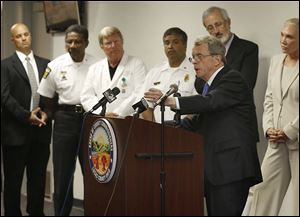
PILOT PROGRAM
Lucas Co. gets $650,000 to fight heroin epidemic
DeWine says problemis one that affects us all
8/13/2014
Ohio Attorney General Mike DeWine announces during a news conference at the Lucas County Emergency Center in Toledo a new pilot program to guide heroin addicts in their recovery. The program launched in June investigates nonfatal overdose cases by reaching out to families and providing resources to get them into treatment.
A pilot program that Lucas County officials are using to tackle the local heroin epidemic got a boost Tuesday from the Ohio attorney general.
As part of his office’s efforts to help law enforcement, Attorney General Mike DeWine announced that the county will get a $650,000 grant to assist in implementing the local heroin addiction recovery program.
EDITORIAL: Statewide model; AG DeWine makes Lucas an addiction pilot.
The pilot program, which began in June, investigates nonfatal overdose cases by reaching out to the family of the users to provide resources to get them into treatment.
A coalition that includes the Lucas County Sheriff’s Office, Toledo Police Department, the county prosecutor’s office, county coroner, and township and suburban police and fire departments are involved in the program.
“This is not just a law enforcement problem. This is a problem that affects all of us,” Mr. DeWine said during a news conference at the county’s Emergency Medical Service building on Monroe Street. “We are not going to arrest our way out of this problem.”
The local task force is receiving $150,000 to pay for victim advocates in the county prosecutor’s office to provide counseling services for heroin users immediately after heroin overdoses occur.
The attorney general is also providing $500,000 to pay for post-treatment housing where recovering heroin users can receive support and aftercare.
Mr. DeWine said he hopes about 200 people can be served annually with the housing grant.
The grant also includes money for a study by University of Toledo students to evaluate the program and gauge its effectiveness.
“It can tell us how well it works. What went wrong and the positive difference in the outcome,” Mr. DeWine said. “Our goal is take this beyond the county and later to take it statewide.”
Sheriff John Tharp said the pilot program fosters increased dialogue among police and fire personnel with 911 dispatchers to let each other know they are handling overdose victims on emergency calls.
With that information, police can later conduct follow-up interviews at hospitals and with the drug users’ families.